US election: Donald Trump's five lines of attack on Clinton
- Published
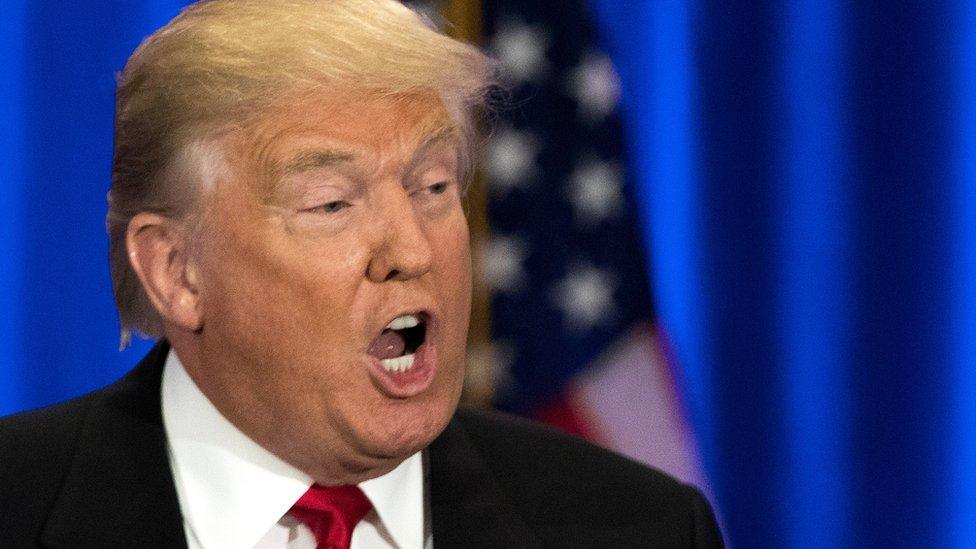
Donald Trump promised a bare-knuckles speech with sweeping attacks on Hillary Clinton, and on Wednesday he delivered it.
He accused the Democratic presumptive nominee of criminal corruption. He called her a "world-class liar". He offered a bullet-point summation of an anti-Clinton book written by a conservative commentator. And he read a letter from the widow of a police officer killed by an undocumented immigrant who said the former secretary of state had the "blood of so many on her hands" and should "go to prison to pay for the crimes she has already committed against this country".
Guided by his teleprompter, Mr Trump offered a more focused, methodical attack on Mrs Clinton than he has normally produced in his stump speeches, but it wasn't any less inflammatory - or prone to occasional exaggerations and misrepresentations.
If Mr Trump will be a more polished candidate with the change of campaign leadership announced this week, it seems clear he will be no less the brash, braggadocious candidate that stormed through the Republican primary season.
He emerged from that campaign victorious - but is now struggling to find his footing in a one-on-one battle with his Democratic foe. Wednesday's speech was his most significant effort to date to regain his equilibrium and shift focus to his opponent's record.
Here are the five primary lines of attack Mr Trump relied on in his Wednesday speech - and what they could mean for the presidential race in the weeks and months to come.

She's part of a rigged system
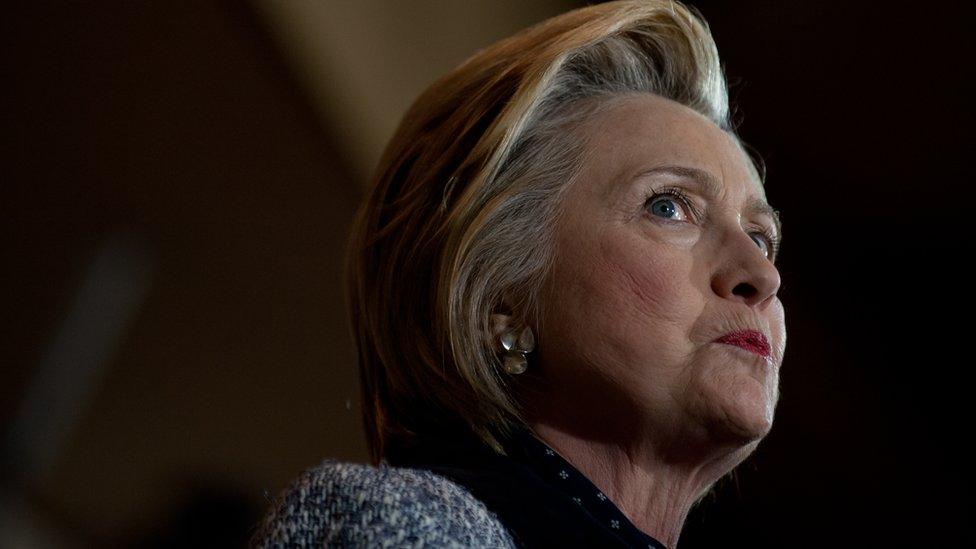
"This election will decide whether we are ruled by the people or by the politicians."
How do you take down a woman who has credentials as a secretary of state and a US senator, is the wife of a two-term president and has been in and around politics for three decades? By painting her as the embodiment of a "rigged" system that is designed to benefit the rich and connected at the expense of average Americans.
The outsider-v-insider strategy is a familiar one in US politics - run successfully by Barack Obama, Ronald Reagan and Bill Clinton himself. And given the levels of anxiety and anti-establishment animosity over the course of the past year, it could be Mr Trump's most effective way of framing the race.
Mr Trump opened on this front - "We will never be able to fix a rigged system by counting on the same people who rigged it in the first place" - before moving to a direct appeal to the backers of Bernie Sanders, the man who effectively ran a similar type of strategy against Mrs Clinton in the Democratic primaries.
He responded to Mrs Clinton's campaign slogan "I'm with her" by saying that he's with the American people - mirroring the "He's with us" line many Sanders supporters touted during their campaign.
Veracity: Mrs Clinton has been in politics a long time. While her status as the first female major-party nominee sets her apart, painting her as part of the establishment isn't a stretch.
Effectiveness: Pulling in die-hard Sanders supporters may be a tough task for Mr Trump, but if he can capitalise on the sentiments that fuelled the Vermont senator's "revolution", he could find similar success.

She's a job-killer
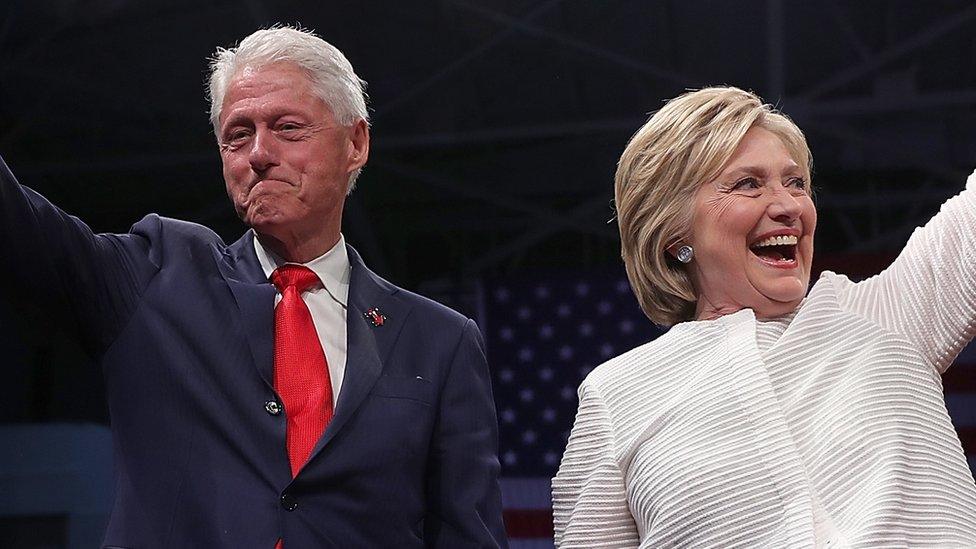
"I have visited the cities and towns across America and seen the devastation caused by the trade policies of Bill and Hillary Clinton."
Nothing encapsulates the bizarro nature of this year's presidential campaign better than the sight of a presumptive Republican nominee attacking his Democratic opponent for supporting free trade deals.
But Mr Trump is a different kind of Republican nominee - more in the economic populist mould of Pat Buchanan and Ross Perot than Chamber of Commerce darlings Mitt Romney and John McCain.
During the Democratic primary campaign, Mrs Clinton backed off her previous support of the Trans-Pacific Partnership after Mr Sanders used it to paint her as being against working-class voters. Now Mr Trump, with his condemnations of "globalisation", appears set on picking up where the Vermont senator left off and running firmly to Mrs Clinton's left on the trade issue.
Veracity: The economic impact of free trade in the US is mixed - the benefits are diffuse while the pain on some industries is significant. Like her husband, Mrs Clinton has a record of support for free trade deals like 1993's Nafta.
Effectiveness: If there's one part of the US where an anti-free-trade message will resonate, it's in the industrial Midwest, which has been hit hard by manufacturing job losses. Not coincidentally, this is also the area that the Trump campaign has identified as the key to winning an electoral majority that can deliver the presidency.

She does dodgy deals
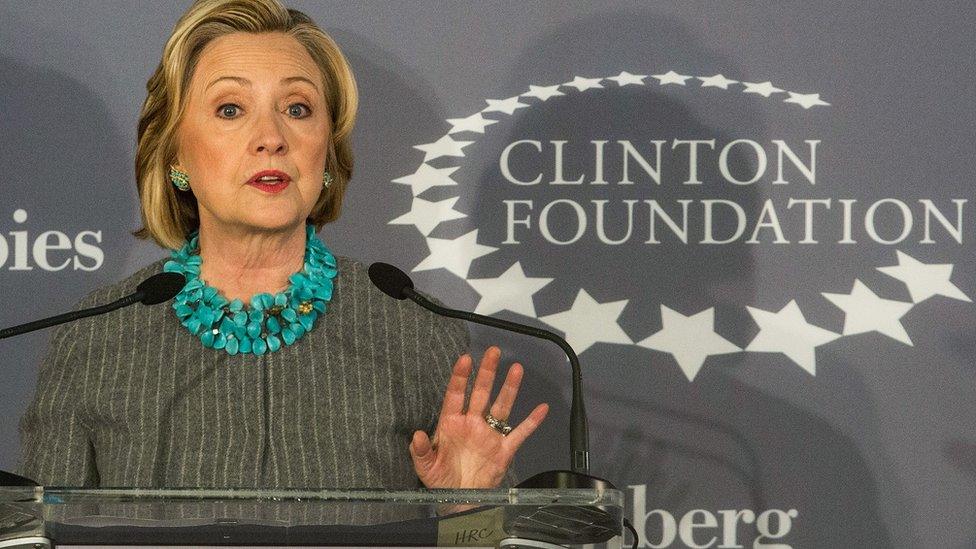
"She ran the State Department like her own personal hedge fund - doing favours for oppressive regimes, and many others, in exchange for cash."
Mr Trump levelled a number of explosive charges against Mrs Clinton - the types of accusations that permeate the conservative blogosphere and talk-radio circuit but are unusual coming from the party's presumptive nominee, who traditionally takes a higher road.
He accused her, in essence, of criminal graft - using her powers as secretary of state to line her own pockets. He said she gave favourable trade deals and made business arrangements in exchange for lucrative speaking fees for her husband, allowed uranium tranfers to Russia in return for millions of dollars directed to the Clinton Foundation and accepted millions from mid-east countries that oppress gays and women.
To support his claims, he cited the book Clinton Cash by conservative commentator Peter Schweizer of Breitbart News.
Veracity: The allegations in Clinton Cash were first revealed in the New York Times prior to the book's publication, and while they expose possible conflicts of interest there has yet to be any evidence of the quid-pro-quo that Trump states as fact. When Mr Trump charged that Mrs Clinton's accepting $56,000 in jewellery from the Sultan of Brunei, for instance, he didn't mention that the items were turned over to the US government upon receipt - an omission that makes a standard diplomatic practice of "accepting" gifts appear to be clear-cut bribery.
Effectiveness: The Clinton Foundation news generated a fair amount of heat last April but was largely forgotten, as Republicans and the media focused on Mrs Clinton's use of a private email server as secretary of state. Possible inappropriate relations with wealthy foreign officials and businesses - even if they don't amount to criminality - could prove fertile ground for Mr Trump in the general election, although at some point he may have to explain why he, too, was a Clinton Foundation donor.

She's encouraging un-American immigrants
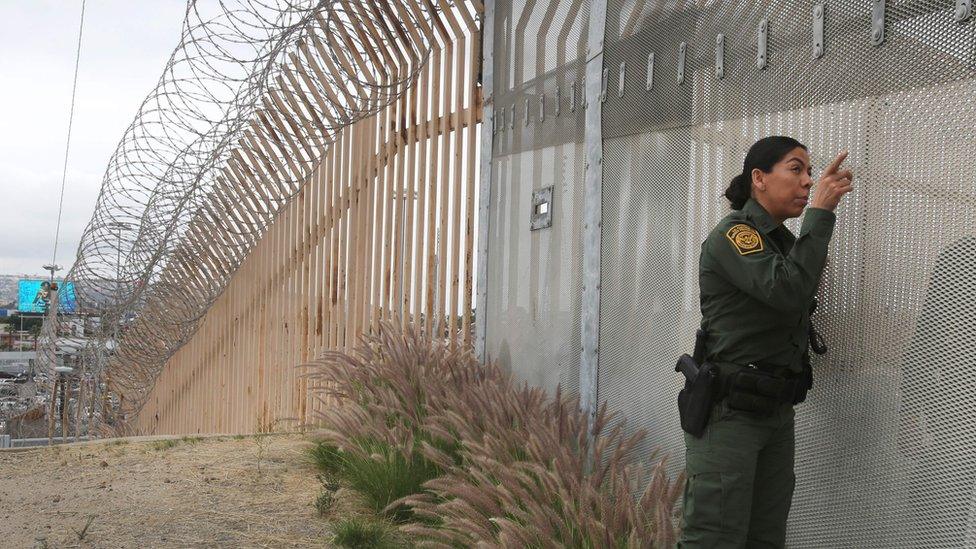
"I only want to admit people who share our values and love our people. Hillary Clinton wants to bring in people who believe women should be enslaved and gays put to death."
After his widely panned speech on immigration and national security last week following the Orlando shooting, Mr Trump was more delicate in his handling of the issue on Wednesday. He once again repeated charges that Mrs Clinton supports a "radical 550% increase" in refugees from Syria, although he doesn't mention that the increase is from 10,000 to 65,000.
Interestingly, he largely framed the immigration debate in terms of jobs and what he identified as the anti-gay, anti-women views of Muslims.
He said Mrs Clinton's "Wall Street immigration agenda" will bring in low-wage workers that hurt minority communities. And he noted that the father of the Orlando shooter was from Afghanistan, "one of the most repressive anti-gay and anti-women regimes on earth".
And he once again implied that Mrs Clinton's position on immigration may be due to the donations she received while at the State Department.
Veracity: Mr Trump continues to inflate the numbers and cost of Mrs Clinton's immigration positions, and diminish the rigourousness of the refugee-screening process. The economic impact of immigration, however, is a subject of debate - it can be a boon to businesses and lower the costs of goods and services, but it also can drive down wages for low-income workers.
Effectiveness: The immigration issue was instrumental in Mr Trump's march to the top of the Republican pack last year. The type of rhetoric he used - while welcomed by many Republican primary voters -cost him dearly among minority voters in the larger electorate. If Mr Trump can frame the issue as one of jobs and security, however, he could find a larger audience more receptive. Given that it's only one week removed from his latest controversial statements on the subject, however, it may be much too late for that.

She messed up the Middle East
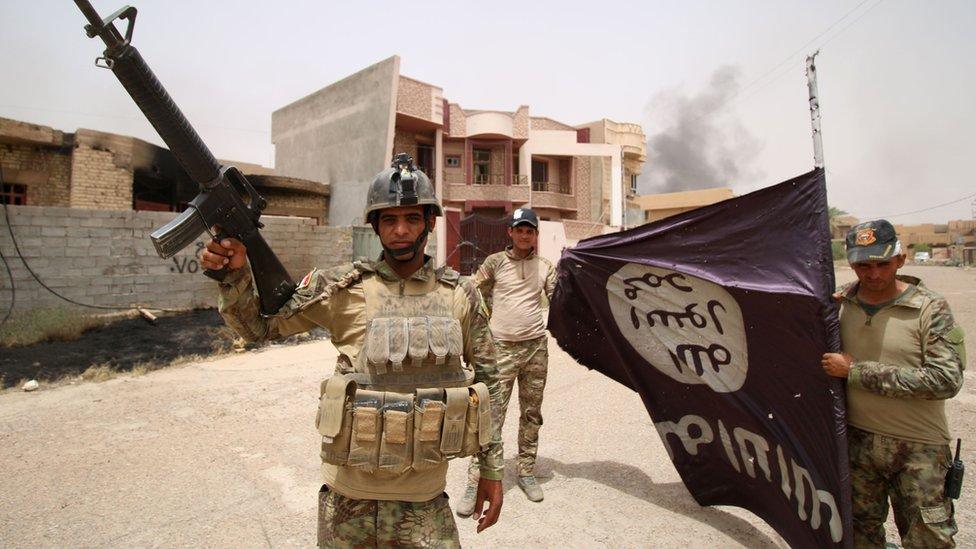
"The Hillary Clinton foreign policy has cost America thousands of lives and trillions of dollars - and unleashed Isis across the world."
Mr Trump laid the Arab Spring uprising and all the resulting instability in the Mid-East squarely at Mrs Clinton's feet. He painted a picture of a world that was largely secure when she became secretary of state in 2009 - Iraq was growing more stable, Iran and Syria were under control, Egypt was friendly, Libya was "co-operating" and the so-called Islamic State "wasn't even on the map".
Since then, he said, everything has basically gone to hell - and largely because Mrs Clinton supported intervention in Libya, backed "violent regime change in Syria" and stood by as the Muslim Brotherhood toppled Hosni Mubarak in Egypt.
The attack on the US consulate in Benghazi also gets a mention, with Mr Trump directly blaming Mrs Clinton for Ambassador Chris Stevens's death.
"He was left helpless to die as Hillary Clinton soundly slept in her bed," Mr Trump said.
Veracity: Even if Mrs Clinton were some genius super-villain, single-handedly destabilising an entire region in a mere four years as secretary of state would be quite an achievement. However, she supported the US invasion of Iraq which was a factor leading to the Arab Spring. The accusations of Clinton culpability in the Benghazi attack will be music to conservative ears, but have been roundly dismissed by US military and government officials involved in the immediate response.
Effectiveness: Foreign policy is usually not a driving issue in US presidential elections, although Mrs Clinton's position as a former secretary of state does make it more relevant this year. Many Americans are concerned about the situation in the Middle East - particularly if it contributes to militant acts on US soil. Past Republican candidates have found success attacking their opponents on their perceived strengths, external - a path Mr Trump appears to be following here.